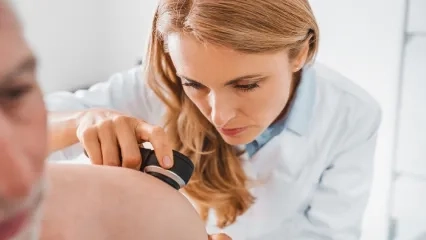Alo Yeditepe
Alo Yeditepe
Sunburn
The effect of sunburn is not limited to temporary conditions such as pain, redness, or peeling skin. It can also lead to problems such as faster skin aging and skin cancer. Stating that sunburns are a completely preventable problem, Skin, and Venereal Diseases Specialist Dr. Prof. Dr. Özlem Akın answers the questions about sunburns.
What Problems Can Solar Rays Cause?
Everyone needs the sun's rays to produce the vitamin D needed to have healthy and strong bones. However, necessary precautions must be taken while ensuring this. Because unprotected exposure to excessive sunlight can cause harmful consequences in many ways, from the skin to the eyes and even our immune system. Excessive exposure to the sun's UV rays can cause sunburn, premature skin aging, and even skin cancer. Although there are environmental factors and heredity factors for skin cancer, unprotected sun exposure is also a crucial factor.
Seemingly innocent sunburns are very important. The pain it creates can cause permanent damage far beyond complaints such as redness. As well as accelerating skin aging, sunburns are an important risk factor in most cases of basal cell carcinoma and squamous cell carcinoma melanoma.
Why Are Sunburn Cases on the Rise?
It can be said that the thinning of the ozone layer, the fact that bronze skin has become fashionable, and the use of artificial light sources such as solarium contribute to the increase.
Who Are the Risk Groups for Sunburn?
People with certain physical characteristics are at greater risk for sunburn. People with white-skinned, blue eyes and red or blond hair are more at risk.
However, for burns: working outdoors increases exposure to sunlight, living or vacationing in hot or high-altitude areas with intense sunlight, going out in the sun with alcohol, constantly wetting the skin under the sun without preservatives, or swimming also increases the risk of burns.
One of the most important risk groups for burns is those that expose the skin to UV light from sunlight or artificial sources such as solarium without using sunscreen.
Is There a Risky Time, Risky Area, or Risky Situation in Terms of Sunburn?
The risk of sunburn increases depending on the sensitivity of the person's skin to the sun and the strength of UV rays. However, some times and hours are especially risky for sunburns. However, it should be known that the harmful effects of the sun do not occur only in summer and in the open air. It should not be forgotten that UV rays can also be effective in cloudy weather and even cold weather.
In terms of the risk of sunburn, the indicator of how strong the sun is, is the UV index. The higher this value, the higher the risk of burns. Moreover, as the value increases, the time required for the burn to occur decreases. It is possible to say that the risk increases if the UV risk is 3 and above.
You can use the shadow rule to find the right time. When you look at your shadow, the fact that it is shorter than your height indicates that the sun's UV rays are strong and must be protected. Therefore, the UV index should be examined.
Risky situations: Working in the sun, and playing sports increase the risk.
However, there are strong UV rays all year round near the equator. Therefore, the risk is higher for those who are in these regions.
It should also be noted that UV rays are stronger at high altitudes. Therefore, it should not be forgotten that people who are interested in sports such as mountaineering and skiing can easily burn. Because up to 85% of UV rays are reflected from snow, sand, and water.
Do Sunburns Cause Herpes?
Although the sun does not cause herpes alone, it is possible to say that it is a triggering factor. Because herpes simplex virus is the cause of herpes. And according to who data, this virus is found in two-thirds of the population. Therefore, excessive exposure to the sun may trigger herpes formation in people in this group who have the virus.
How Long Does It Take for Sunburns to Heal?
The healing time of sunburns varies depending on some factors. For instance, a problem that delays wound healing, such as the degree of burn, how the burn is managed, or underlying diabetes, can also affect healing time.
Since burns are caused by overexposure to UV rays, the more exposure to these rays, the greater the risk. Likewise, the recovery time is directly proportional to the severity of the burning. Because with severe burns, it will take time for the body to replace the damaged skin layer. Therefore, in mild sunburns, complaints begin to decrease within 3-5 days, while in more severe burns, recovery may take a few weeks. However, factors such as the age and general health of the person are also effective in the healing process. Therefore, mild burns can be expected to heal on their own, but medical attention should be sought for more severe burns.
How to Treat Sunburns?
A warm shower should be taken frequently to reduce the pain. After the bath, it should be dried lightly and then a moisturizer should be applied and the moisture of the bath should be trapped in the skin. Aloe vera moisturizers will help soothe sunburned skin. Products containing caine (such as benzocaine) should not be used as it may irritate the skin or cause allergic recurrence. Hydrocortisone-containing creams can be applied to uncomfortable areas. Aspirin or ibuprofen may be considered to reduce redness, swelling, and tenderness. Extra water should be consumed to prevent water loss. These filled blisters should not be burst to help heal the wound and prevent infection. It should be protected from the sun during healing.
About
Faculty and Year of Graduation:
Selçuk University, 1993
”
See Also
- Does Sunburn Cause Skin Cancer?
- How Often Should You Take a Shower?
- Sunburns Can Leave Permanent Damage
- Causes of Hair Loss
- Itching can be a Symptom of Another Disease
- Scabies Disease
- Ehlers-Danlos Syndrome
- Do Not Underestimate Itching!
- Intense Stress Makes Hair Ringworm
- Urticaria Decreases the Quality of Life
- Pollen is Now Seen Outside of Seasonal Changes
- How Should We Protect Our Skin During the Summer Season?
- 15 Ways to Protect Skin During Winter
- Skin Microbiota May Affect Immunity!
- Acne and Diet
- How to Protect Yourself from Sunburn?
Alo Yeditepe





